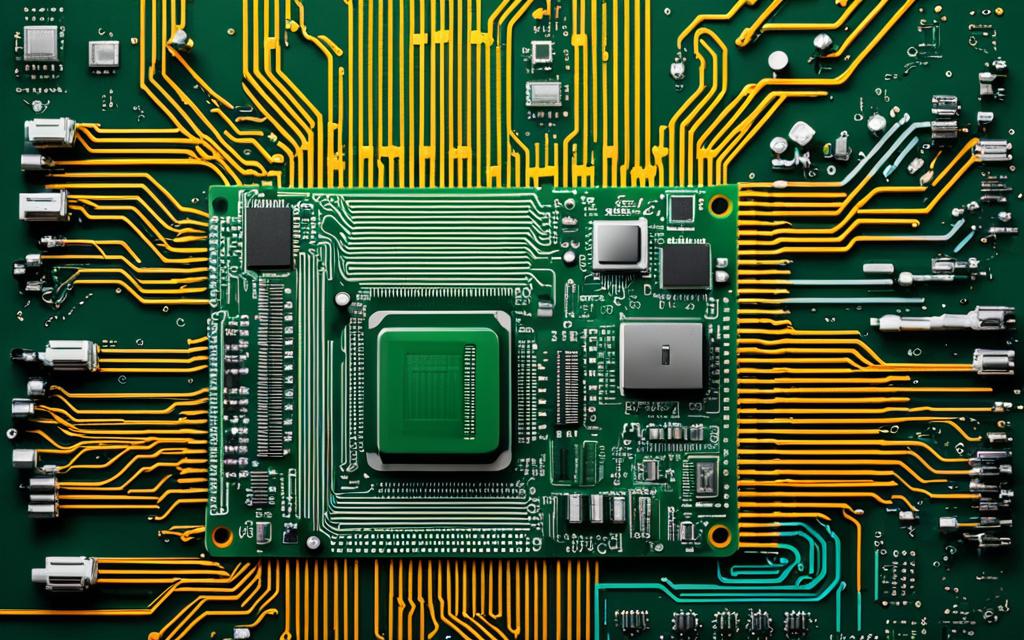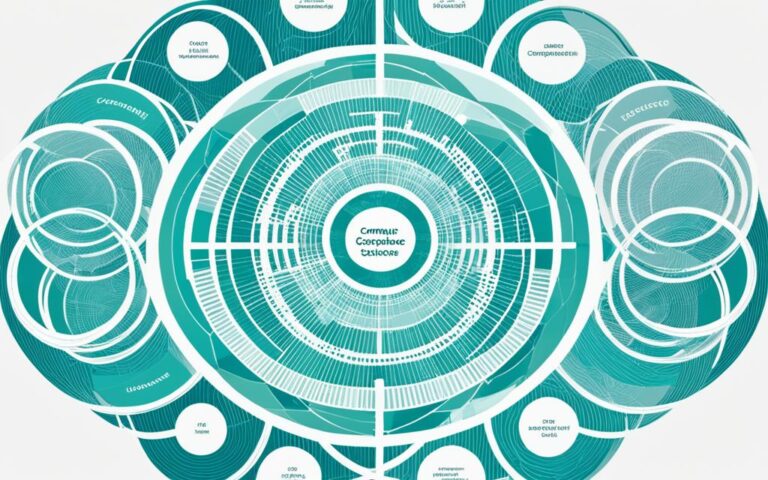Computer engineering and computer science are two key areas in tech. They both need a solid base in computer tech. But, they have different focuses and courses. We’ll look into whether computer engineering is tougher than computer science. We’ll check out various parts of both fields to see how hard they are.
Key Takeaways
- Computer engineering and computer science are two distinct fields with different focuses and coursework.
- Both fields require a strong foundation in computer technology.
- Computer engineering involves hardware design and optimization, while computer science focuses on software-related skills.
- Job growth in both fields is projected to be strong, with computer science experiencing a higher growth rate.
- Median salaries in the computing industry are competitive, offering attractive opportunities for professionals.
Understanding Computer Engineering
Computer engineering is a blend of computer science and electrical engineering. It’s all about designing and developing computer systems. This includes combining software and hardware. People in this field learn a lot about computer architecture, microprocessors, and digital systems.
Students study subjects like microelectronics, digital signal processing, and calculus-based physics. These classes teach them how to design and improve computer hardware and its interfaces. This knowledge helps them create efficient and innovative computer systems.
Computer engineers work in many fields, from telecommunications to consumer electronics. They develop new technologies, improve computer performance, and solve big challenges. With their technical skills and creativity, they shape the future of technology.
One student found the first year tough due to the big change from high school to university. The early classes seemed too theoretical and didn’t relate to real life. But as they moved on, the courses became more practical and interesting, matching their interests.
Studying computer engineering takes hard work and dedication. But it’s worth it. Former students say it’s key to attend classes, listen, and work hard. This approach helped them overcome challenges and gain the skills needed in computer engineering.
After graduating, computer engineering opens many doors. It prepares students for exciting careers in robotics, embedded systems, and digital design. A student moved from architecture to computer engineering and found their passion. They finished their degree in four years, got a good job, and earned a good salary. The job market in computer engineering is strong, offering more opportunities than fields like biology or business administration.
Computer engineering is challenging but rewarding. Students learn a lot and develop skills for a successful career in technology. The course combines theory with practical experience, leading to great job prospects and a good social life. Starting a career in computer engineering means joining a world full of innovation and possibilities.
| Statistic | Data |
|---|---|
| Annual job openings in the computer and information technology sector from 2022 to 20321 | 377,500 |
| Projected job growth for computer scientists from 2022 to 20321 | +23% |
| Median annual salary for computer scientists1 | $136,620 |
| Projected job growth for information security analysts from 2022 to 20321 | +25% |
| Median annual salary for information security analysts1 | $124,200 |
| Projected job growth for software developers from 2022 to 20321 | +26% |
| Median annual salary for software developers1 | $127,260 |
| Projected job growth for computer hardware engineers from 2022 to 20321 | +5% |
| Median annual salary for computer hardware engineers1 | $132,360 |
Exploring Computer Science
Computer science is a fascinating field that covers computing theory, cybersecurity, algorithms, and computer networks. It lets you dive into the tech world and shape the future of innovation.
It focuses a lot on computing theory. This area looks at the basics of computing. It helps experts make and understand smart systems.
Students in computer science learn to solve complex problems. They study data structures and algorithms deeply. This gives them the skills to handle digital challenges.
With cybersecurity being a big worry today, computer science pays special attention to it. Students learn how to protect computer systems and keep data safe. They also learn to spot and stop cyber threats.
Algorithms are a big part of computer science too. They are the steps that tell computers what to do. These algorithms are key in many technologies, like search engines and machine learning.
Computer science also looks at computer networks. These networks help us share information and communicate. Students learn about how networks work and how to keep them safe and running smoothly.
Computer Science: A Dynamic and Evolving Field
Computer science opens doors in many industries, like tech, finance, and healthcare. Experts in this field help create new software, efficient systems, and advanced tech.
By using computing, computer science pros can change industries and make life better. They work on new algorithms and secure systems. This shapes our digital world.
Technology is always getting better, so computer science is always changing. People in this field need to keep up with new trends and improve their skills. This keeps them leading in innovation.
Overall, computer science is thrilling and full of potential. It’s perfect for those who love tech, computing theory, cybersecurity, algorithms, and networks. By choosing computer science, you can help advance technology and society.
“Computer science is no more about computers than astronomy is about telescopes.” – Edsger Dijkstra
| Aspects | Computer Science | Other Fields |
|---|---|---|
| Degree of Difficulty | The difficulty of computer science is subjective and depends on individual preferences and strengths2. | Varies depending on the field and individual strengths and interests2. |
| Academic Rigor | Computer science programs’ academic rigor varies based on the university, program structure, and course requirements2. | Varies depending on the specific field and university2. |
| Focus Areas | Computing theory, cybersecurity, algorithms, and computer networks. | Varies depending on the field of study. |
| Personal Interest | Personal interest and passion significantly impact the perceived difficulty of computer science courses and major2. | Personal interest and passion can make any major feel more manageable2. |
| Comparison with Pre-med | Computer science is distinct from being “pre-med” and aligns with medical school prerequisites in different ways2. | Choosing a major in fields like biology or anatomy aligns with medical school prerequisites in a more direct manner2. |
Comparing the Courses
Looking at computer engineering and computer science courses shows their different levels of difficulty. Both fields prepare students for various roles in the tech world.
“CMU’s School of Computer Science (SCS) is more selective than the College of Engineering based on admission statistics.”3
Computer engineering combines computer science and electrical engineering. Students learn about digital logic, ethics, and architecture. They understand how hardware and software work together.
Computer science focuses on solving problems with science. Students learn about data structures, algorithms, and designing databases. They also study software development and programming languages.
Both fields require strong analytical and problem-solving skills. Students need to know about digital systems, programming, and maths.
Some universities have rules for moving between computer engineering and computer science majors. It’s important to check each school’s policies3.
Switching majors at some schools is easy, while others may be harder. For example, the University of Michigan makes it easy to change majors due to its support for students3.
It’s key to know that each college is different in how hard it is to switch to Computer Science. Students should look into each college carefully3.
“Georgia Tech reportedly allows easy and early switching of majors, with certain engineering majors specified during the application process.”3
Computer engineering and computer science offer unique skills and knowledge. The choice depends on what you’re interested in, your career goals, and how deep you want to go in tech.
Detailed Course Comparison
| Computer Engineering | Computer Science |
|---|---|
| Digital Logic | Scientific Problem-Solving |
| Computer Architecture | Data Structures and Algorithms |
| Computer Ethics | Database Design |
| Hardware and Software Integration | Software Development |
This table shows some differences between computer engineering and computer science courses. But both fields give a broad education in computer systems and technology.
Salary Comparison
Computer scientists in the US make between $136,000 and $229,000 a year, averaging about $176,000. Software engineers earn between $113,000 and $176,000, with an average of $140,000. Senior software engineers can make up to $282,000, showing career growth and higher pay potential4.
When comparing computer engineering and computer science, think about both the academic and career aspects.
Career Outlook for Both Fields
Computer engineering and computer science both offer bright career prospects in the booming computing industry. The United States Bureau of Labor Statistics predicts over half a million new jobs in the next decade. This growth is due to the rising need for computer experts across different sectors.
Jobs in the field include roles like computer network architect, programmer, and systems analyst. Other roles are database administrator, information security analyst, and web developer. These jobs are key to the computing industry’s growth.
Computer engineering focuses on designing computing systems, from smartphones to complex circuits. It combines knowledge of physics, electrical engineering, and computer science5. Professionals in this field work in various areas, from aerospace to robotics5.
Computer science, on the other hand, involves creating algorithms for complex tasks. It covers software development, network and database design, and web design5. Both fields offer strong career paths with similar skills.
Both computer engineering and computer science require math-intensive courses6. The skills learned in these fields are versatile, fitting both hardware and software roles7. The high demand for professionals in both areas ensures a bright future for those entering these fields7. Plus, the competitive salaries make it a financially rewarding choice7.
In conclusion, the future looks promising for both computer engineering and computer science. The computing industry’s growth means a steady supply of exciting job opportunities7. Whether you lean towards computer engineering or computer science, you’re set for a dynamic and fulfilling career in the fast-paced tech world.
Potential for Remote Work
The COVID-19 pandemic changed how we work, making remote work common in many fields, including IT. Now, many jobs in the IT sector can be done from home. Before the pandemic, about 10% of workers in the information industry worked remotely8.
IT professionals like computer engineers and scientists are great for remote work. They can work from anywhere, enjoying more flexibility and a better work-life balance9. This means they can skip the daily commute and work in a place they feel most productive.
Remote work in IT isn’t just about being convenient. Research shows remote workers are more productive and happier than office workers9. They can focus better without office distractions. Plus, they can make their work environment fit their needs, which makes them more satisfied with their jobs9.
Employers in IT see the perks of remote work too. It can save companies a lot of money, about $11,000 per half-time remote worker each year8. It also lets companies hire talent from anywhere, not just nearby9. This means more job chances for people in remote areas and for companies to find the best talent worldwide.
Remote work is here to stay, with over 60% of developers working from home full-time in 20229. This trend is likely to grow as both workers and employers see its benefits. It offers IT professionals the flexibility they want, helping them balance work and life. As the IT industry changes, remote work will be key in shaping its future.
For more info on remote work in IT, check out these resources:
- Working Remote in Computer Science
- Computer Scientist vs. Computer Engineer
- Software Engineers: Remote or Onsite?
References:
- 8 DigitalOcean: Study results on remote work in the IT industry.
- 9 Remote work statistics and trends in the IT industry.
Unique Challenges in Computer Engineering
Computer engineering is a thrilling and fast-changing field. It brings unique challenges for both professionals and students. These come from the technical aspects, math needs, physics classes, and the demand for exact answers and precise problem-solving.
Technical Nature of the Field
Computer engineering covers many complex topics, like digital systems design and computer architecture. This technical depth can be overwhelming for many10. shows that many find computer engineering tough because of its technical demands. It needs a solid grasp of math, logical thinking, and careful attention to details.
Math Requirements and Physics-Based Classes
Math and physics are at the heart of computer engineering. Students need a strong math base and must apply math to solve real problems. Classes in physics add to the challenge with topics like circuit analysis and electromagnetics10. Experts say knowing hardware is key for being a good programmer.
Importance of Exact Answers
Accuracy is crucial in computer engineering. Unlike some fields, exact answers are needed here. This can be tough for those who find it hard to use math in real situations10. Experts highlight the need for detail and logical thinking in this field.
Work-Life Balance and Mental Exhaustion
The complex nature of computer engineering can affect well-being. Engineers often work long hours on tough problems10. Many say the job can be very tiring. It’s vital to keep a good work-life balance to avoid burnout and mental exhaustion.
Despite these challenges, computer engineering offers great chances for growth. Overcoming these hurdles can lead to a fulfilling career in a field that’s always innovating.
Unique Aspects of Computer Science
Computer science is a field that offers unique challenges and opportunities. It’s different from computer engineering, which focuses on technology’s practical use. Computer science goes deeper, into the theoretical foundations of computing. It requires a deep understanding of theory and algorithms.
One key part of computer science is its focus on theory and abstraction. Scientists work with abstract concepts and models that are the foundation of computing systems. They study algorithms, which are step-by-step procedures for solving problems. Knowing how to design efficient algorithms is key, needing a strong grasp of math and problem-solving skills11.
Turning theory into practical code is vital in computer science. Scientists take the work of engineers and apply it to real situations. They translate complex math into code that computers can run. This process is crucial and requires strong math and algorithm skills11.
Computer science also looks at the limits and possibilities of computing systems. It explores what machines can and can’t do, and how efficient algorithms are. Knowing these limits helps in creating new solutions and improving what computers can do11.
Problem-solving and logical thinking are big parts of computer science. Scientists are trained to tackle problems in a systematic way. This helps them create efficient algorithms and solve complex problems creatively11.
Even though it’s theoretical, computer science has many real-world uses. It’s key in fields like artificial intelligence, data science, and cybersecurity. The skills learned in computer science open doors to exciting careers across many industries111.
| Occupation | Median Annual Salary | Projected Job Growth |
|---|---|---|
| Computer Scientist | $136,620 | +23% |
| Information Security Analyst | $124,200 | +25% |
| Software Developer | $127,260 | +26% |
| Computer Programmer | $97,800 | -11% |
| Computer Hardware Engineer | $132,360 | +5% |
| Computer Systems Analyst | $102,240 | +10% |
Computer science jobs are in high demand, with growth rates above average in many areas. Salaries for these roles are well above average, making them financially rewarding112.
Theory, Formulas, and Problem-Solving
Computer science combines theory, formulas, and problem-solving skills. It’s a field that blends math, logic, and creativity. Whether it’s designing algorithms, analyzing systems, or applying theoretical concepts, computer science offers a unique and exciting journey for tech enthusiasts and problem-solvers11.
Varied Difficulty Levels in Engineering
Choosing a career in engineering means understanding the different levels of difficulty. Civil and industrial engineering are often seen as easier. But, computer, electrical, and aerospace engineering bring their own set of challenges.
Computer engineering blends computer science and electrical engineering. It covers hardware and software design, needing skills in electronics, telecoms, programming, and architecture13. With tech changing fast, computer engineering demands ongoing learning and adaptability.
Civil engineering is about designing and maintaining infrastructure. It includes modules like structural analysis and transportation engineering, leading to jobs in government, construction, and consulting13. Civil engineering might seem less tough than some other fields, but understanding its principles is crucial for building safe structures.
Electrical engineering focuses on electricity, electronics, and electromagnetism. It involves complex math and keeping up with tech changes in areas like telecoms, biomedical tech, and power systems13. Electrical engineering’s depth and constant changes require dedication and ongoing learning.
Aerospace engineering is a tough branch that covers aircraft and spacecraft design. It needs knowledge in aerodynamics, propulsion, structural analysis, and control systems, offering jobs in various sectors13. Aerospace engineers must deeply understand complex systems and solve tough engineering problems.
Difficulty levels vary, but all engineering fields need dedication, critical thinking, and problem-solving skills. Each field has its own challenges and rewards. It’s key for engineers to think about their strengths and interests when choosing a career path.
Exciting Career Opportunities
Computer engineering and computer science offer many exciting career paths across industries like healthcare, communications, and business14. These fields are also found in marketing, fashion, gaming, graphic design, education, AI, and more14.
Professionals can choose from various roles, such as a DBA, coder, software developer, data scientist, or project manager14. They can also work as a computer technician or in other related fields14.
The need for computer engineering and science experts is growing fast. Computer engineering is expected to increase by 5% from 2021 to 203115. Computer science is set to grow by an impressive 21% during the same period15.
With a master’s degree in computer science, you can find rewarding jobs like data scientist or full stack senior software engineer15. Other promising areas include product management, cybersecurity architecture, and AI/ML expertise15.
Computer science jobs often pay more than computer hardware engineering jobs as they require knowledge of software and machine-learning algorithms15.
Skills in computer engineering and science are crucial in today’s tech world. Companies value people who know both hardware and software well7.
| Field | Projected Job Growth (2021-2031) |
|---|---|
| Computer Engineering | 5% |
| Computer Science | 21% |
Computer engineering is a specialized field that combines hardware and software knowledge. It’s highly valued by employers7. The admission and curriculum for computer engineering are strict but offer unique skills in demand7.
Graduates who enjoy computer engineering are highly wanted by employers. This shows the worth of a computer engineering degree7.
Getting a degree in computer engineering or computer science leads to rewarding and well-paid careers. It helps you contribute to the fast-changing tech world14157.
Conclusion
Choosing between computer engineering and computer science is a personal choice. Both fields have their own challenges and chances for growth. Computer engineering deals with hardware, while computer science looks at algorithms and theory. Your decision should match your skills, interests, and career aims.
In the UK, a computer engineering degree costs between £11,800 to £23,500 a year. Computer science degrees range from £12,500 to £44,000 annually16. In the US, computer science programs cost about US$32,635 yearly, while engineering degrees are around US$36,13116. Australia sees tuition fees up to AUD 45,000 for engineering and AUD 47,940 for computer science per year16.
Both fields offer great career prospects. The US is set to see around 546,200 new jobs in the computing and IT sector over the next decade17. Computing jobs make up over 16% of US wages17. There’s also a growing need for skilled people in both areas. For example, computer and information research scientists earned a median salary of US$131,490 in 202116.
Choosing between computer engineering and computer science is about what you’re interested in and good at. Both require a solid tech background and skills like detail focus, research, and communication16. Whether you pick computer engineering or computer science, follow your passion and keep learning with technology’s changes18. As technology advances, both fields will be crucial in shaping its future.
FAQ
Is computer engineering harder than computer science?
It depends on your strengths and what you prefer. Both have their own challenges.
What is the difference between computer engineering and computer science?
Computer engineering deals with making hardware and designing interfaces. Computer science looks at the theory and solving problems with algorithms.
What are the key concepts in computer engineering?
Key concepts include hardware components, designing interfaces, and how hardware works with software.
What are the key concepts in computer science?
Key concepts are computing theory, cybersecurity, algorithms, and computer networks.
What are the courses in a computer engineering program?
Courses include digital logic, computer ethics, and computer architecture.
What are the courses in a computer science program?
Courses focus on solving scientific problems, data structures, and designing databases.
What is the career outlook for computer engineering and computer science?
Both fields have bright career prospects. Jobs include computer network architect, programmer, database administrator, and software developer.
Can computer engineering or computer science provide remote work options?
Yes, both fields offer chances for remote work, especially in IT.
What are the unique challenges in computer engineering?
Challenges include needing a strong math background, physics classes, and applying math in real life.
What are the unique aspects of computer science?
It focuses on theory and solving problems with algorithms. It turns engineer’s formulas into code.
Are there varying difficulty levels within the field of engineering?
Yes, engineering specializations like civil, industrial, computer, electrical, and aerospace have different levels of difficulty and coursework.
What career opportunities are available in computer engineering and computer science?
Graduates can work in healthcare, communications, business, marketing, fashion, gaming, graphic design, education, AI, and more.
How do I choose between computer engineering and computer science?
Think about what you’re interested in, your skills, and your goals when deciding between the two.
Source Links
- https://www.forbes.com/advisor/education/it-and-tech/computer-science-vs-computer-engineering/ – Computer Science vs. Computer Engineering: Which Should You Major In?
- https://www.careervillage.org/questions/750460/is-computer-science-a-harder-major-than-pre-med – Is Computer Science a harder major than pre-med?
- https://talk.collegeconfidential.com/t/is-engineering-or-computer-science-usually-the-tougher-admit-yes-sometimes-cs-is-in-engineering/2065337 – Is engineering or computer science usually the tougher admit (yes, sometimes CS is in engineering..)
- https://www.springboard.com/blog/software-engineering/computer-science-vs-software-engineering/ – Computer Science vs. Software Engineering: Decoding Jobs
- https://www.mastersindatascience.org/learning/computer-science-vs-computer-engineering/ – Computer Science vs. Computer Engineering
- https://www.careervillage.org/questions/11488/between-information-technology-or-computer-engineering-which-of-these-is-harder-in-math – Between information technology or computer engineering , which of these is harder in math?
- https://www.physicsforums.com/threads/is-computer-engineering-inferior-to-ee-and-cs.923230/ – Is Computer Engineering “inferior” to EE and CS?
- https://www.computerscience.org/resources/working-remote-in-computer-science/ – Guide to Remote Work in the Computer Science and Tech Industries
- https://distantjob.com/blog/software-engineers-remote-or-onsite/ – Remote Software Engineers or Onsite? Which is Best?
- https://www.careervillage.org/questions/431076/is-computer-engineering-as-hard-as-they-say-it-is – Is computer engineering as hard as they say it is ?
- https://medium.com/bootdotdev/is-computer-science-really-that-hard-c24ad2f10d4d – Is Computer Science Really that Hard?
- https://www.careervillage.org/questions/269733/how-do-you-choose-whether-to-major-in-computer-science-or-software-engineering – How do you choose whether to major in computer science or software engineering?
- https://www.crimsoneducation.org/us/blog/unraveling-engineering-pathways-a-comparative-look-at-the-easiest-and-hardest-engineering-degrees/ – Engineering Pathways: Easiest and Hardest Engineering Majors – Crimson Education US
- https://www.careervillage.org/questions/521218/is-computer-science-a-good-major-or-worth-the-time – Is Computer Science a good major? (or worth the time)
- https://csweb.rice.edu/academics/graduate-programs/online-mcs/blog/computer-science-vs-computer-engineering – Computer Science vs Computer Engineering: What’s the Difference?
- https://studyinternational.com/news/bachelor-of-computer-science-vs-engineering/ – Bachelor of Computer Science vs Engineering: Which is right for you?
- https://www.nu.edu/blog/computer-science-vs-computer-engineering-whats-the-difference/ – Computer Science vs. Computer Engineering: What’s the Difference? | NU
- https://www.physicsforums.com/threads/is-physics-computer-science-or-engineering-the-right-path-for-me.1010766/ – Is physics, computer science, or engineering the right path for me?


















